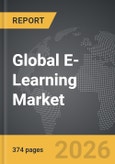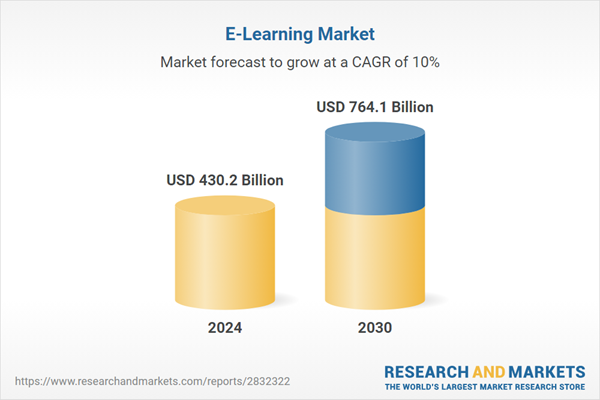Global E-Learning Market - Key Trends & Drivers Summarized
E-learning has emerged as a transformative force in education, leveraging technology to deliver instructional content and facilitate learning beyond traditional classroom boundaries. This digital approach encompasses a wide range of formats, including online courses, virtual classrooms, video tutorials, and interactive modules, accessible through various devices such as computers, tablets, and smartphones. E-learning platforms provide flexible and personalized learning experiences, catering to diverse educational needs from K-12 and higher education to professional development and corporate training. The accessibility of e-learning has democratized education, enabling learners from different geographic and socioeconomic backgrounds to access high-quality educational resources and opportunities that might otherwise be unavailable.The technological advancements underpinning e-learning have significantly enhanced its effectiveness and appeal. Innovations such as learning management systems (LMS), artificial intelligence (AI), and augmented reality (AR) have revolutionized the way educational content is delivered and consumed. LMS platforms streamline the administration, documentation, tracking, and reporting of educational courses, allowing educators to create structured and engaging learning environments. AI-powered tools offer personalized learning paths, adaptive assessments, and real-time feedback, ensuring that students receive tailored support that addresses their individual needs and learning paces. Meanwhile, AR and virtual reality (VR) technologies provide immersive and interactive experiences, bringing complex concepts to life and enhancing engagement through virtual labs, 3D models, and simulations. These technologies not only enrich the learning experience but also improve retention and understanding by providing hands-on, experiential learning opportunities.
The growth in the e-learning market is driven by several factors. Technological advancements have made e-learning platforms more sophisticated and user-friendly, attracting a broad spectrum of users from educational institutions to corporate entities. The increasing adoption of digital devices and the internet has expanded access to e-learning resources, making remote and self-paced learning more feasible and appealing. Additionally, the COVID-19 pandemic has accelerated the shift towards online education, highlighting the necessity and benefits of remote learning solutions during crises. The rising demand for continuous skill development and lifelong learning in an ever-evolving job market has also fueled the popularity of e-learning, as professionals seek to enhance their skills and stay competitive. Moreover, government initiatives and policies promoting digital education and the integration of technology in classrooms have further supported market growth. The global reach of e-learning platforms allows institutions and organizations to offer courses to a wider audience, breaking down geographic barriers and creating new revenue streams. As the emphasis on personalized and flexible learning grows, the adoption of e-learning solutions is expected to continue its upward trajectory, driven by ongoing innovations and the expanding capabilities of digital education technologies.
Report Scope
The report analyzes the E-Learning market, presented in terms of market value (USD). The analysis covers the key segments and geographic regions outlined below.- Segments: Segment (Academic, Corporate & Government).
- Geographic Regions/Countries: World; USA; Canada; Japan; China; Europe; France; Germany; Italy; UK; Rest of Europe; Asia-Pacific; Rest of World.
Key Insights:
- Market Growth: Understand the significant growth trajectory of the Academic E-Learning segment, which is expected to reach US$481.4 Billion by 2030 with a CAGR of 9.6%. The Corporate & Government E-Learning segment is also set to grow at 10.9% CAGR over the analysis period.
- Regional Analysis: Gain insights into the U.S. market, valued at $115.8 Billion in 2024, and China, forecasted to grow at an impressive 12.2% CAGR to reach $170.7 Billion by 2030. Discover growth trends in other key regions, including Japan, Canada, Germany, and the Asia-Pacific.
Why You Should Buy This Report:
- Detailed Market Analysis: Access a thorough analysis of the Global E-Learning Market, covering all major geographic regions and market segments.
- Competitive Insights: Get an overview of the competitive landscape, including the market presence of major players across different geographies.
- Future Trends and Drivers: Understand the key trends and drivers shaping the future of the Global E-Learning Market.
- Actionable Insights: Benefit from actionable insights that can help you identify new revenue opportunities and make strategic business decisions.
Key Questions Answered:
- How is the Global E-Learning Market expected to evolve by 2030?
- What are the main drivers and restraints affecting the market?
- Which market segments will grow the most over the forecast period?
- How will market shares for different regions and segments change by 2030?
- Who are the leading players in the market, and what are their prospects?
Report Features:
- Comprehensive Market Data: Independent analysis of annual sales and market forecasts in US$ Million from 2024 to 2030.
- In-Depth Regional Analysis: Detailed insights into key markets, including the U.S., China, Japan, Canada, Europe, Asia-Pacific, Latin America, Middle East, and Africa.
- Company Profiles: Coverage of players such as Adobe Inc., Aptara Corp., Articulate, Cisco Systems, Inc., Conduent Inc. and more.
- Complimentary Updates: Receive free report updates for one year to keep you informed of the latest market developments.
Some of the 290 companies featured in this E-Learning market report include:
- Adobe Inc.
- Aptara Corp.
- Articulate
- Cisco Systems, Inc.
- Conduent Inc.
- Microsoft Corporation
- Oracle Corporation
- SAP SE
- Peoplefluent
- Udemy, Inc.
This edition integrates the latest global trade and economic shifts into comprehensive market analysis. Key updates include:
- Tariff and Trade Impact: Insights into global tariff negotiations across 180+ countries, with analysis of supply chain turbulence, sourcing disruptions, and geographic realignment. Special focus on 2025 as a pivotal year for trade tensions, including updated perspectives on the Trump-era tariffs.
- Adjusted Forecasts and Analytics: Revised global and regional market forecasts through 2030, incorporating tariff effects, economic uncertainty, and structural changes in globalization. Includes historical analysis from 2015 to 2023.
- Strategic Market Dynamics: Evaluation of revised market prospects, regional outlooks, and key economic indicators such as population and urbanization trends.
- Innovation & Technology Trends: Latest developments in product and process innovation, emerging technologies, and key industry drivers shaping the competitive landscape.
- Competitive Intelligence: Updated global market share estimates for 2025, competitive positioning of major players (Strong/Active/Niche/Trivial), and refined focus on leading global brands and core players.
- Expert Insight & Commentary: Strategic analysis from economists, trade experts, and domain specialists to contextualize market shifts and identify emerging opportunities.
Table of Contents
Companies Mentioned (Partial List)
A selection of companies mentioned in this report includes, but is not limited to:
- Adobe Inc.
- Aptara Corp.
- Articulate
- Cisco Systems, Inc.
- Conduent Inc.
- Microsoft Corporation
- Oracle Corporation
- SAP SE
- Peoplefluent
- Udemy, Inc.
Table Information
| Report Attribute | Details |
|---|---|
| No. of Pages | 374 |
| Published | January 2026 |
| Forecast Period | 2024 - 2030 |
| Estimated Market Value ( USD | $ 430.2 Billion |
| Forecasted Market Value ( USD | $ 764.1 Billion |
| Compound Annual Growth Rate | 10.0% |
| Regions Covered | Global |









